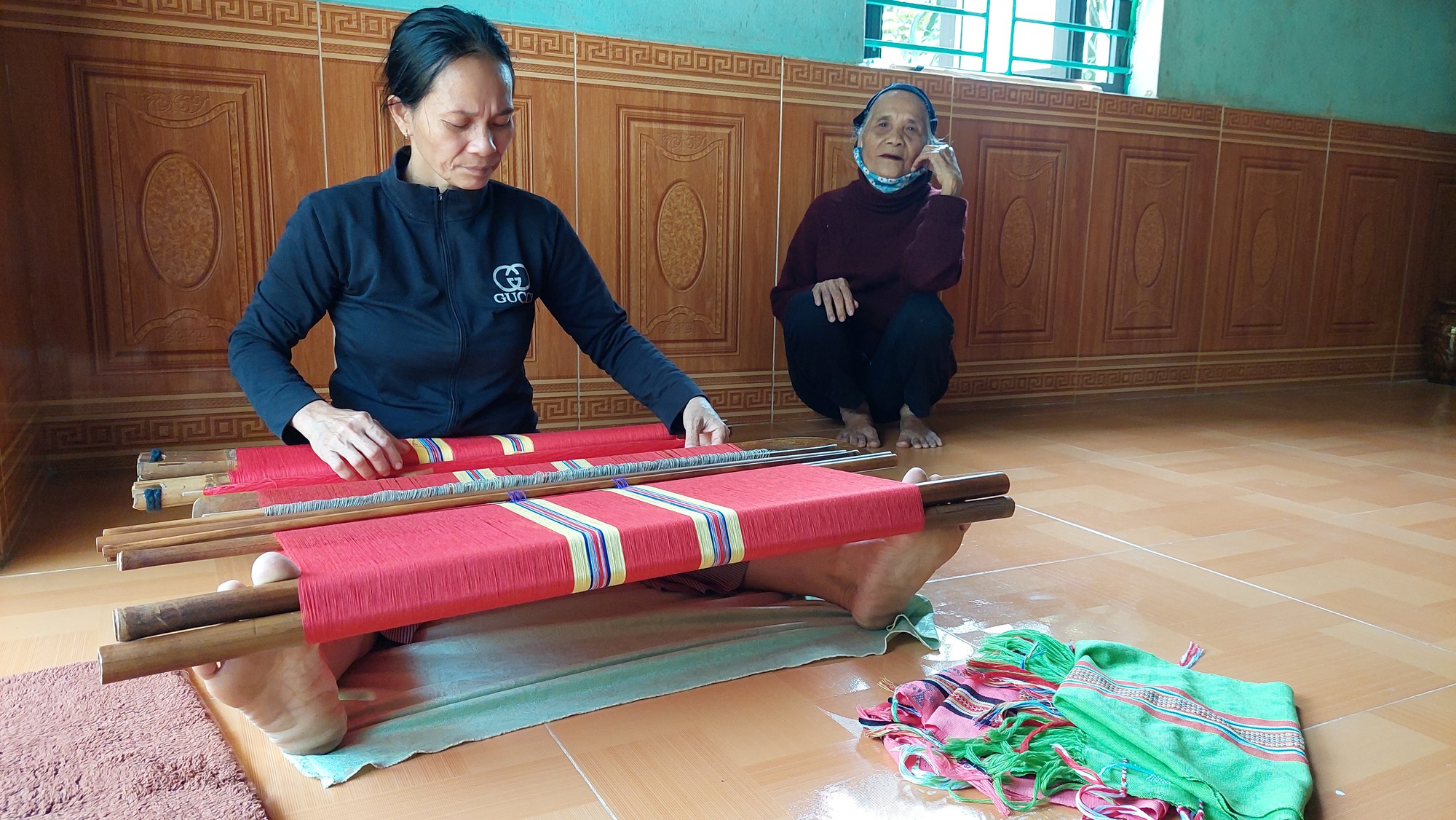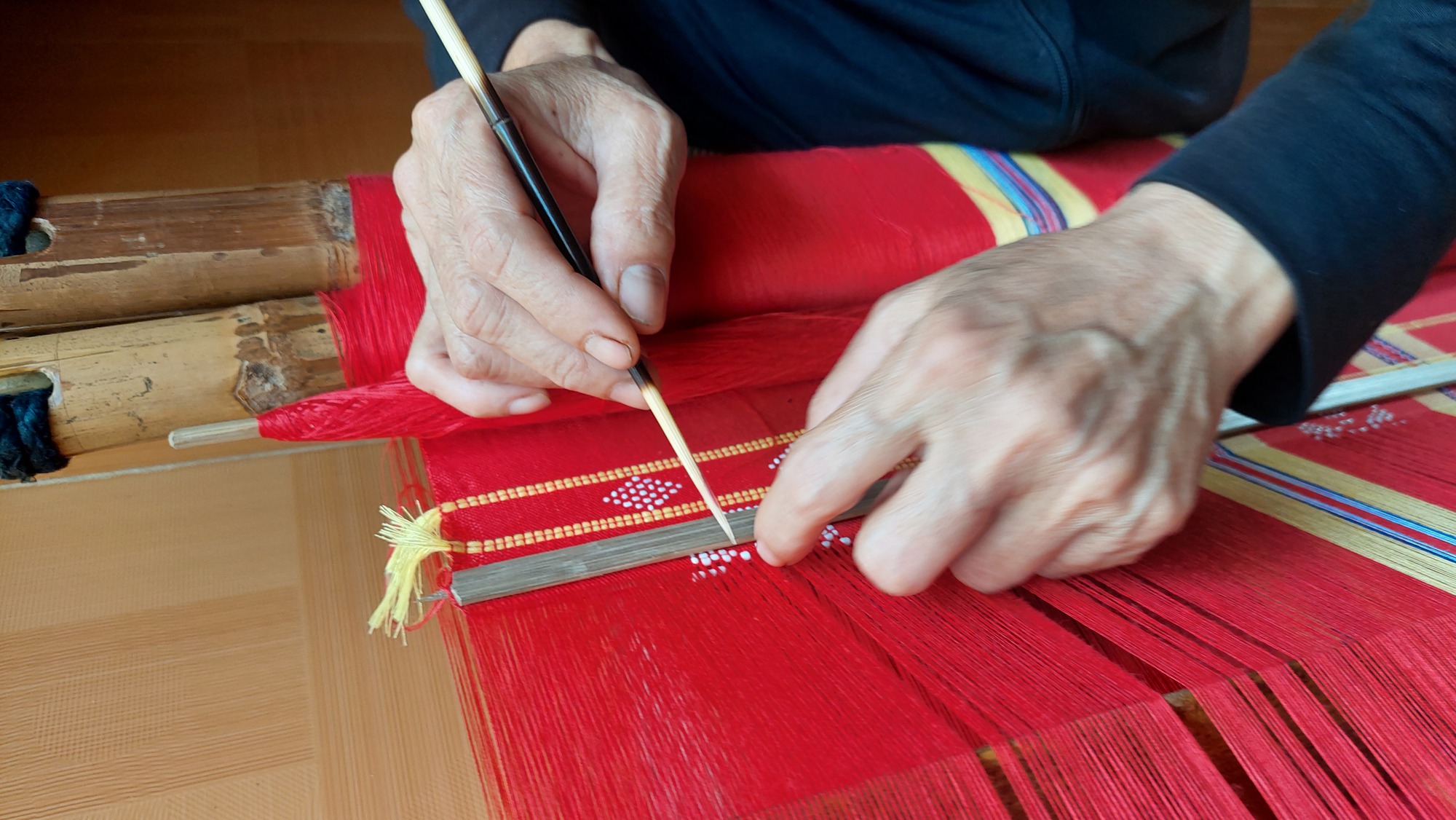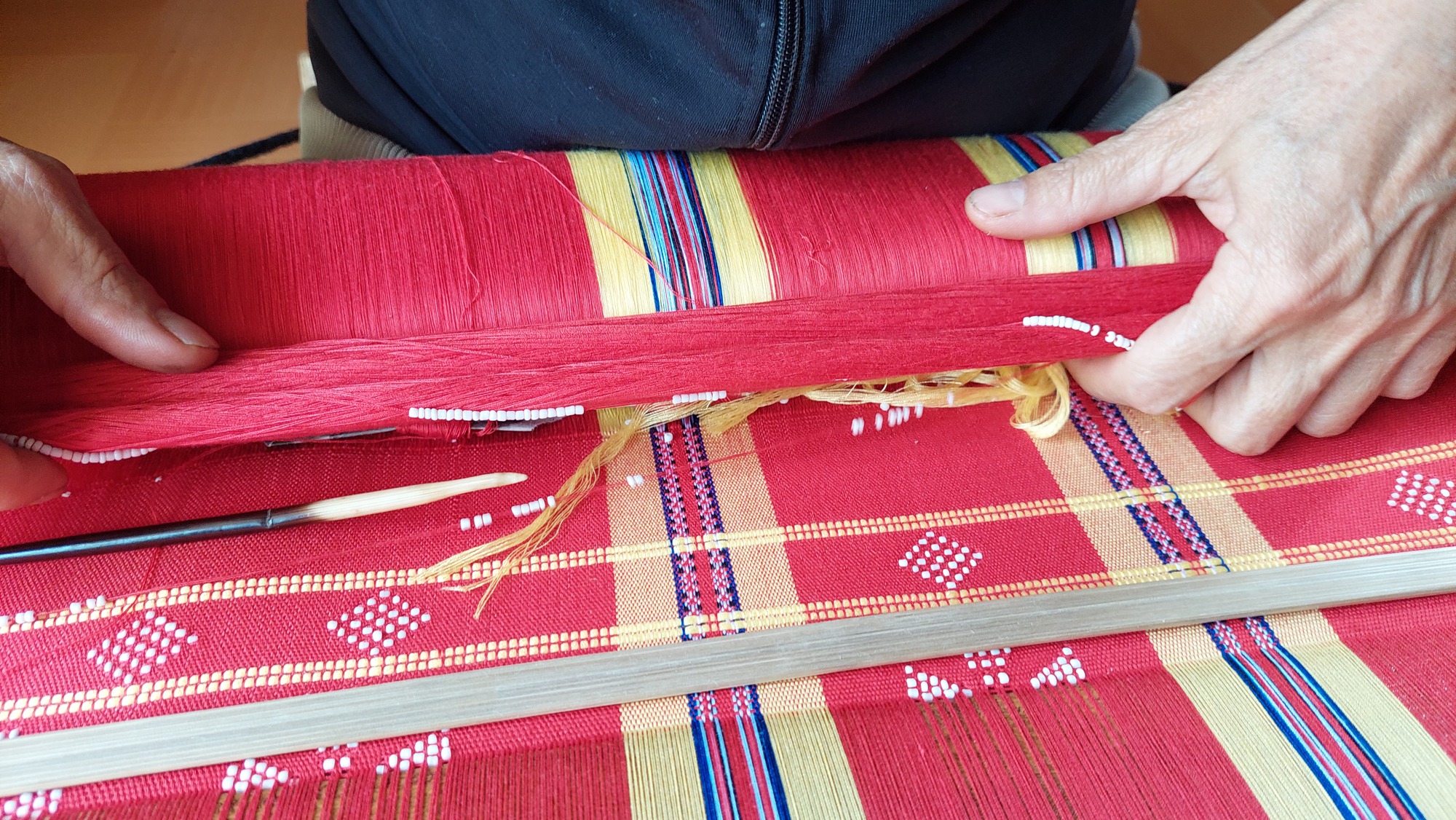"If we don't study, who will follow in our footsteps?"
In the memory of Mrs. Nguyen Thi Nhum (80 years old, Gian Bi village, Hoa Bac commune), in the past, brocade fabrics were something every Co Tu girl dreamed of wearing upon reaching adulthood. However, not everyone could own one, because hand-woven brocade fabric was very expensive. Back then, in the lowlands of Co Tu like Hoa Bac, she only occasionally saw wealthy people using it. Then, by the 1980s, Mrs. Nhum no longer saw anyone weaving brocade. "About 40-50 years ago, the brocade weaving craft of our people disappeared," Mrs. Nhum said sadly, "Even I couldn't learn the craft passed down from our ancestors…"

The Co Tu brocade weaving craft in Da Nang City has revived but is facing many difficulties.
Therefore, in 2018, when the local government organized traditional brocade weaving classes, Mrs. Nhum encouraged her daughter, Dinh Thi Tin (48 years old), to try to attend. Her encouragement also reflected the dreams she herself didn't have the opportunity to fulfill in her youth. Twenty women from the two villages of Ta Lang and Gian Bi were brought together to form the Co Tu Brocade Weaving Cooperative in Hoa Bac commune. Two outstanding brocade weaving artisans from Dong Giang district ( Quang Nam province ) directly taught the classes, imparting skills from basic to advanced levels.
Similarly, Ms. Nguyen Thi Mai (46 years old, residing in Ta Lang village) was once fascinated by the patterns and designs on the brocade fabrics of the women in Nam Giang, Tay Giang, and Dong Giang (Quang Nam province), and always wondered why the Co Tu women in Hoa Bac couldn't weave them. After researching and learning that the brocade weaving craft had long been lost, Ms. Mai encouraged other women in the village to learn the trade.
The first days of class were truly difficult for the women… "We were used to working with machetes and hoes, going to the fields in the morning and returning home in the evening. Now, standing before the loom, our hands tremble. There were times I wanted to put down the loom and go back to the forest… But the traditional craft of our people has been lost, and if we don't learn it in our generation, who will follow it in the future?", Mrs. Tin shared.
Having overcome the initial difficulties, Mrs. Tin, like the other women, gradually became accustomed to the clicking sound of the loom. Their hands and feet, once clumsy, became nimble with the movements of spinning, stretching threads onto the frame, threading yarn, and attaching beads… Once they became proficient, Mrs. Tin began to mix threads and weave the patterns she had previously admired, developing a passion for weaving without even realizing it.


We need a market for our products.
After more than a year of apprenticeship and another year of advanced training, Ms. Tin has independently honed her skills to weave brocade fabrics to her satisfaction. The unevenly woven fabrics have gradually been replaced by eye-catching pieces with exquisite stitching. The beads threaded onto the yarn are also more evenly spaced. Now, after four years of learning and pursuing her passion, Ms. Tin can weave many different types of fabrics, such as fabric for ao dai (traditional Vietnamese dress), vests, backpacks, handbags, and scarves. The traditional brocade of the Co Tu people is popular with many international tourists and is often brought back home on flights.
The urgent need to preserve the traditional clothing of the Co Tu people.
According to the Da Nang City People's Committee, although the traditional brocade weaving craft has been revived, the supply is insufficient for the community. The Co Tu people in Da Nang have to order brocade from mountainous districts in Quang Nam province and Ha Luoi district (Thua Thien- Hue province). While the brocade of the Co Tu people in Da Nang retains traditional patterns, the material is industrial fiber. The Da Nang City People's Committee assesses that if not preserved in time, traditional costumes will disappear, and the traditional cultural identity will be impossible to restore.
However, not many women possess the same high level of skill as Ms. Tin. It's her passion that has kept her in the craft, but making a living from it is not easy because the income is too low. "The fastest I can weave a piece of fabric each day is about 40 cm long. If I work diligently and don't make mistakes, I can only make two pieces of fabric for ao dai (traditional Vietnamese dress) each month, which I sell for less than 2 million dong," Ms. Tin said.
Ms. Le Thi Thu Ha, Secretary of the Party Committee of Hoa Bac commune, said that since 2018, the commune has guided the Co Tu people to revive the traditional brocade weaving craft. The weavers have learned to weave fabric and sew their own clothing and decorative items… "However, brocade weaving is only about restoring cultural traditions and creating tourism products. Developing the craft to boost the economy and increase income is not yet possible because there is no market for the products, and the cost of materials for weaving is quite high…", Ms. Ha acknowledged.
In the Project to Support and Promote the Culture of the Co Tu Ethnic Group in Da Nang City for the period 2022-2030, the Da Nang City People's Committee also set the goal of restoring and developing the traditional brocade weaving craft. A positive sign is that Da Nang will provide traditional costumes for 100% of Co Tu students and teachers (2 sets/year). In the coming years, besides products for tourism, with thousands of new costumes needing to be made, brocade weavers will have steady work, contributing to the revival of this traditional craft…
(to be continued)
Source link




![[Photo] General Secretary To Lam meets with members of the subcommittees preparing for the 14th Party Congress.](https://vphoto.vietnam.vn/thumb/1200x675/vietnam/resource/IMAGE/2026/02/10/1770721375846_a1-anh-bnd-6254-482-jpg.webp)
![[Photo] General Secretary To Lam meets with representatives of retired and former military generals.](https://vphoto.vietnam.vn/thumb/1200x675/vietnam/resource/IMAGE/2026/02/10/1770724375943_a1-bnd-6680-1023-jpg.webp)
































































































Comment (0)